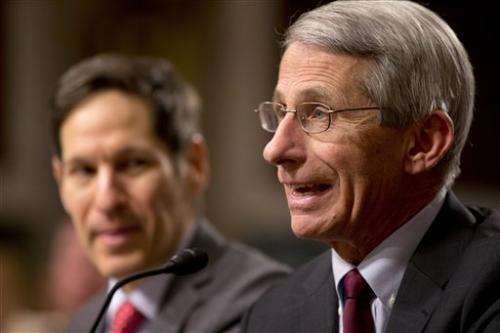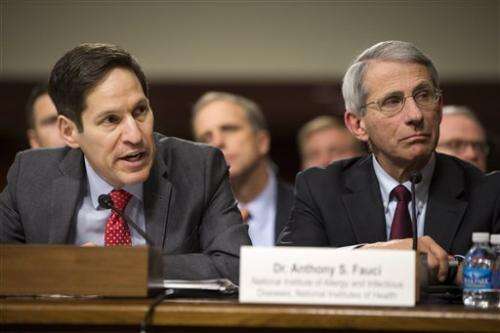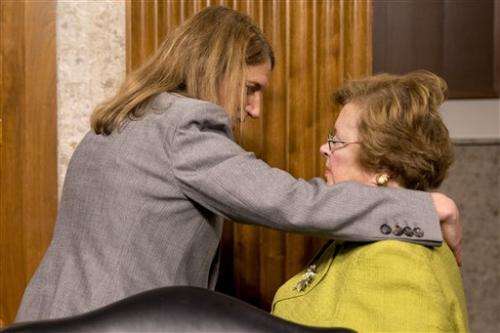Centers for Disease Control and Prevention Director Dr. Thomas Frieden listens as left, listens as National Institute of Allergy and Infectious Diseases Director Anthony Fauci testifies on Capitol Hill in Washington, Wednesday, Nov. 12, 2014, before the Senate Appropriations Committee hearing on the government's Ebola response. (AP Photo/Jacquelyn Martin)
A top U.S. health official says long-anticipated clinical trials of a possible Ebola vaccine will start soon in West Africa, as the global response to the outbreak took on added urgency with new cases in Mali and reports that the death toll has surpassed 5,000.
Results of an initial U.S. safety study proved promising enough that next-step testing should begin in Liberia and Sierra Leone by January, Dr. Anthony Fauci of the National Institutes of Health told a Senate committee on Wednesday.
If those new studies go well, "we could know by the middle of 2015 whether or not we have an effective vaccine," said Fauci, director of NIH's National Institute of Allergy and Infectious Diseases.
The news came as the Senate Appropriations Committee began evaluating the Obama administration's request for $6.2 billion in emergency aid to fight Ebola.
While the number of infections is slowing in some parts of West Africa, the World Health Organization said cases still are surging in Sierra Leone. Worse, nearby Mali on Wednesday reported three deaths linked to Ebola and mobilized to stop the virus' spread.
"That cluster has to be controlled or we're going to have another front," warned Dr. Tom Frieden, director of the Centers for Disease Control and Prevention.
The spending request includes $4.64 billion in immediate money to fight the epidemic in West Africa while at the same time shoring up U.S. preparedness. The domestic work includes such things as continuing training so far given to 250,000 nurses and other U.S. health workers on how to safely handle any future patients, designating hospitals capable of handling Ebola or other serious infectious diseases, and creating a national stockpile of protective equipment.
Centers for Disease Control and Prevention Director Dr. Thomas Frieden, left, accompanied by National Institute of Allergy and Infectious Diseases Director Anthony Fauci, testifies on Capitol Hill in Washington, Wednesday, Nov. 12, 2014, before the Senate Appropriations Committee hearing on the government's Ebola response (AP Photo/Jacquelyn Martin)
Some of the money also would go to setting up health systems in other vulnerable countries so they could spot similar outbreaks early and avoid a crisis.
Included in the funding request is $238 million for the NIH for clinical trials of experimental vaccines and treatments. The vaccine question aside, Fauci said NIH brought together doctors who had cared for the nine Ebola patients treated in the U.S., to look at records of experimental treatments they received.
Health and Human Services Secretart Sylvia Burwell, left, hugs Senate Appropriations Committee Chair Sen. Barbara Mikulski, D-Md.,on Capitol Hill in Washington, Wednesday, Nov. 12, 2014, after Burwell testified before the committee's hearing on the government's Ebola response. (AP Photo/Jacquelyn Martin)
© 2014 The Associated Press. All rights reserved.





















